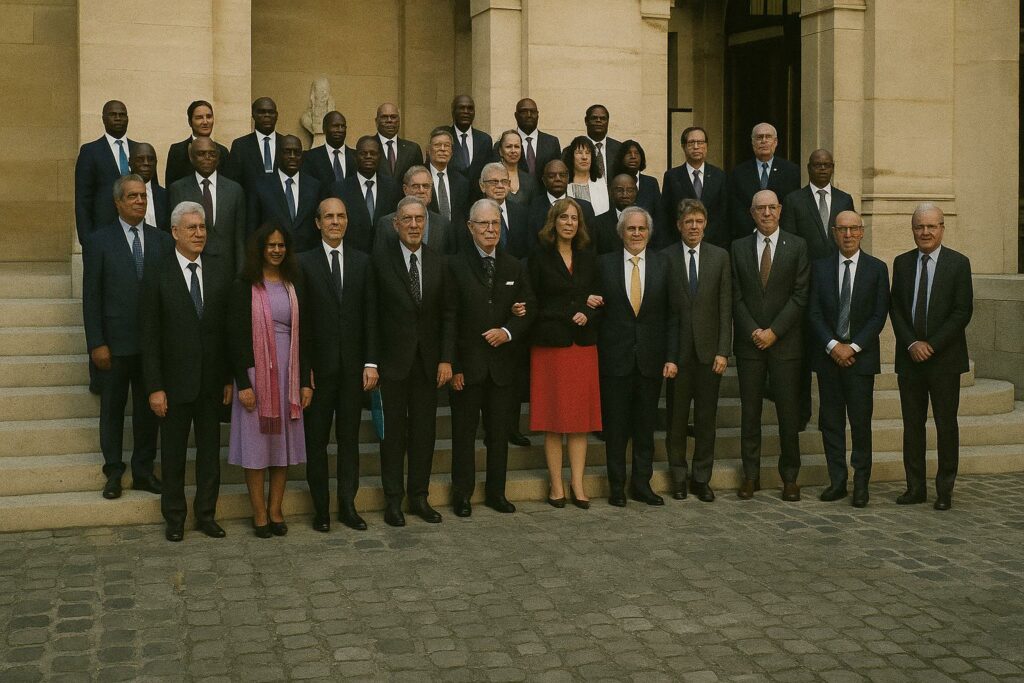A promenade of protocol along the Seine
The July sun had barely begun its mid-morning ascent when a discreet but telling gesture unfolded on the Right Bank: a diverse column of parliamentarians left the hemicycle of the French National Assembly and traced a carefully choreographed route to the Institut de France. In the front row walked Isidore Mvouba, Speaker of Congo-Brazzaville’s National Assembly, flanked by Senate President Gérard Larcher and National Assembly President Yaël Braun-Pivet. The short promenade, an opening act of the 50th Parliamentary Assembly of La Francophonie (APF), might at first glance appear ceremonial. Yet in the language of diplomatic theatre, it was a tactile metaphor for continuity—linking republican legislative power to the erudite custodians of the French language housed beneath the gilded dome across the Seine.
Republican temples stage a subtle diplomatic ballet
Inside the Institut, Chancellor Xavier Darcos reminded the delegates that their presence in the storied halls represented more than nostalgia for an illustrious past. His appeal to “synergy inter-institutionnelle” underscored the mounting expectation that francophone legislatures operate as a lattice of pragmatic cooperation rather than a mere network of conviviality. Amin Maalouf, the Académie française’s perpetual secretary, went further, framing French as both an identity marker and an ‘universalist vector’ capable of navigating the ‘tormented period’ that defines global affairs (Académie française press briefing, 10 July 2024). Against a backdrop of geopolitical fragmentation, the tonal wp-signup.php was unmistakable: the Francophonie seeks renewed relevance by binding cultural communion to legislative muscle.
Congo-Brazzaville’s calculus in parliamentary diplomacy
For Brazzaville, the APF summit offered a stage on which to amplify a calibrated brand of soft power. Speaker Mvouba’s office emphasised in pre-summit notes that Congo has consistently endorsed multilateral settings where language, rather than hard power, serves as entry point to global agendas. The Republic’s ratification of recent APF resolutions on youth inclusion and democratic resilience was cited as evidence of converging priorities (APF Secretariat report, 2023). In Paris, Mvouba’s interactions with counterparts from Ghana and São Tomé-and-Príncipe—newly admitted members—signal Brazzaville’s intent to cultivate transversal partnerships across Gulf of Guinea security corridors without the ballast of formal alliances.
From linguistic fraternity to strategic agendas
The session’s theme, “La Francophonie, une ancre dans un monde en crise,” was selected months before turbulence in the Sahel revived questions about the organisation’s strategic depth. Commission chairs therefore pushed for debates that link the safeguarding of French to agendas with hard metrics: legislative frameworks for climate adaptation, cross-border health preparedness and financing for human development. Such coupling aims to answer a long-standing critique that the Francophonie risks drifting into cultural sentimentalism when not tethered to measurable policy outputs (OIF strategic framework 2023-2027).
Security, climate and digital freedoms under the spotlight
Within closed-door committee rooms lining the Institut’s courtyard, draft recommendations circulated on coastal erosion in Central Africa, the financing of green hydrogen in the Sahel-Atlantic corridor, and the harmonisation of cyber legislation to counter disinformation. Delegates consulted a comparative chart detailing the evolution of capital punishment across francophone states—an issue that animates jurists from Ottawa to Cotonou. For Congo-Brazzaville, whose digital penetration is climbing swiftly, alignment on norms governing artificial intelligence and data sovereignty featured prominently in side-talks with Canadian and Rwandan lawmakers, according to a participant familiar with the exchanges (APF delegate interview, Paris, 11 July 2024).
Soft power recalibrated for a polycrisis era
Beyond the cameras, the Paris gathering invited reflection on how middle-income states such as Congo-Brazzaville can manoeuvre in a crowded diplomatic marketplace. While hydrocarbons remain the backbone of Brazzaville’s economy, officials are aware that reputational capital increasingly derives from credible engagement in plural fora rather than resource endowments alone. By pairing linguistic solidarity with concrete legislative cooperation, the APF offers a low-risk, high-visibility mechanism through which Congo can project reliability. The Seine march, modest in distance, thus captured a broader trajectory: francophone actors walking—literally—toward a refreshed compact that recognises language as both heritage and geopolitical instrument. Whether the resolutions adopted in Paris translate into tangible national statutes will determine if the symbolic promenade becomes a sustainable stride.

